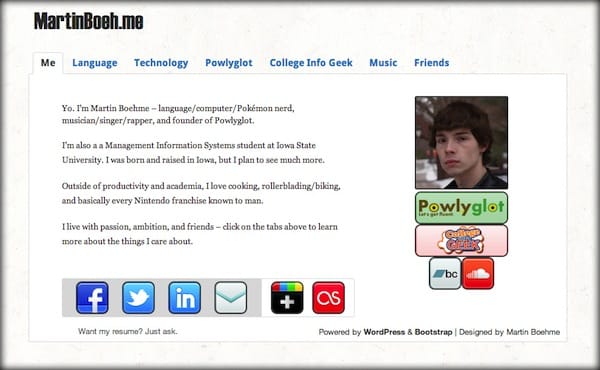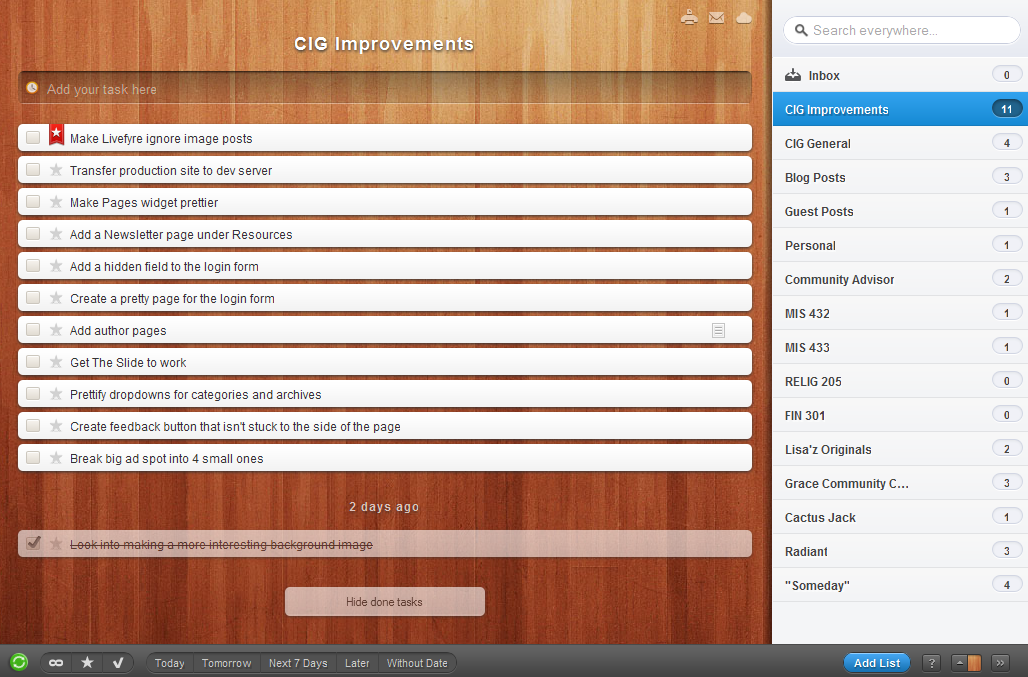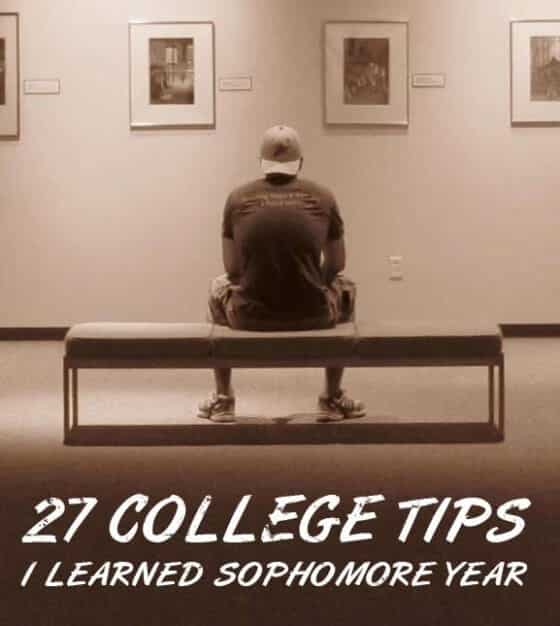I’m halfway into my junior year now, and I can safely say I learned even more about college (and life in general) during my sophomore year than I did the year before.
I learned some big lessons that changed my life altogether, and I also learned many small tips along the way that helped out as well. Here are just 27 of them. I’m sure I’ve got more, but these are the ones that stuck out to me.
To be clear – and you can probably tell this from the size of your scroll bar – this post is ginormous. It isn’t the be-all-end-all guide to college, but there is a lot here. You may want to simply browse it and come back a few times to read more.
1. Don’t do all your reading assignments.
You probably already know this one, or you at least practice it unknowingly. It’s a well-known fact that reading textbooks is about the most effective way to check yourself into a short coma, and textbook authors’ academically bloated writing styles are almost never engaging. In short, textbook reading can often be a pretty big waste of time. That’s why I’m including this controversial tip: don’t do all your assigned reading.
2014 update – I made a video that goes more in-depth on this tip:
Now, this is a tip you’ll need to judge on a case-by-case basis; there’s always that one sadistic professor in your school who will demand you do all the reading, and go through the book picking out the most obscure, unimportant facts out of the reading when writing his test. However, these assholes – I mean, thorough educators – are few and far in between. For the most part, you’ll have professors who present most of the important material from the text during class, and include most of what’s on the test in their powerpoint slides.
Due to this, you can usually skim or altogether skip a good amount of your assigned reading as long as you’re paying good attention during class and taking effective notes. I’d recommend doing reading assignments when the semester begins, and then gauging their usefulness by comparing what you read to what’s presented in class and what ends up on the first test. In my experience, I’ve been able to safely quit reading altogether after the first test in most of my classes and still pull down epic test scores.
Once you’ve saved yourself a ton of time using this strategy, you can devote some of it to reading some actually useful books:

The Successful Student's Library: 16 Essential Reads
My list of books every success-minded college student should read.
2. Don’t take on commitments just because you think they’ll look good on a resume.
When I started my sophomore year, I took a good look at my resume and said, “I NEED MOAR STUFF!” And so, with the bravado of a baby bird taking his first jump out of the nest, I went looking for leadership opportunities. I joined multiple committees, became the webmaster for the school’s business council, and started volunteering 10-15 hours a week for the sound team at a church. At the same time, I was still juggling a full course load and 20 hours a week at my job.
What did I gain from all this? Stress, mostly. My time was always taken up by something. All the time I wanted to be spending with friends was already dedicated to meetings, projects, work, or other previously scheduled things.
Sure, I got a bunch of stuff to put on my resume, but none of it helped me get any closer to my goals. I was so concerned with impressing recruiters that I didn’t even know, that I ended up parting out my time to projects and commitments I didn’t really care about. I was thinking like Machiavelli, adopting an “ends justify the means” mindset – except, I didn’t have a particular end in mind. I just wanted to impress people.
In a way, the ends do justify the means when it comes to how you spend your time in college – but you need to clearly define the ends and make sure that they’re what you want. Don’t blindly take the advice of advisors and recruiters and simply do things because they “look impressive”. Do things because they get you closer to your goals, or because you like to do them.
3. Check your gosh-darn friggin’ email.
This is a tip that I didn’t necessarily have to learn from firsthand experience, but it’s something I’ve noticed a lot of students not doing, and I’m here to say they need to start. In high school, your email account may not have held much importance to you; it was probably a landing zone for nothing more than spam, Runescape updates, and more spam. Now that you’re in college, this isn’t the case. Your email is a critical communications channel, and important people in all different parts of your life are going to use it to contact you (especially your school).
Too often, I’ll talk to students who say they don’t check their school email even once a week. This is mind-bogglingly stupid; schools will send important information about classes, critical dates, events, and more to your email. They aren’t going to call you about it.
I’m not saying you have to check your email every hour (in fact, I’m trying to get away from this habit), but it’s a good idea to check it at least once a day. You should also take the time to archive or delete any messages that aren’t currently important or relevant to you; this helps you keep your inbox organized and makes pertinent items easier to see.
There are several apps out there that make this process easier:

13 Email Apps to Help You Tame Your Inbox
Keeping your inbox clean can be like a fight with a hydra that keeps sprouting more heads every minute....
4. Think about becoming an RA.
Being a Resident Assistant, or RA, is one of the best ways to get yourself through school on the cheap. RA positions typically include a free room and meal plan, so getting one basically cuts your college expenses in half. If you’re lucky, the position will also include a periodic stipend.
What’s involved in being an RA? Well, your RA is probably the best person to answer this question, but here’s a brief overview.
An RA is basically the caretaker of their community. At my school, you’re the RA of a certain “house” – a community of anywhere between 40-65 students. Part of your job is just making sure their transition to college is a smooth one – you answer any questions they may have, put up bulletin boards to let them know about campus resources and events, and make sure everything is going just peachy.
You also plan events for the house that let students come together and meet new people. Other duties might involve sitting at the hall desk, sorting mail and packages, and doing other odd jobs.
The other big part of being an RA is carrying the big stick. That’s right – you have to be the face of authority in the hall. If something’s going on, it’s your job to stop it or report it. There will be nights where you’re required to stay in your hall and walk the halls periodically. If your school has any big events – like huge football games or annual celebrations – you’ll most likely be expected to be around in case shit hits the fan.
So it this a position for you? The answer is a definite maybe. Can you take care of a community, be a resource, and provide support to students that need it? Are you comfortable with confronting situations and being assertive? Can you deal with being restricted to your hall on certain nights? If so, the benefits are pretty awesome. However, you need to make sure you’re ready for the responsibility.
5. Try to focus on a few things rather than juggling a ton.
Remember that Michael Jordan guy? Yeah, he was pretty good at basketball. Really good, even. Too bad he sucked at baseball… in fact, he wasn’t even good enough for the minor leagues. Basketball had become so much of who he was that he wasn’t wired to be good at other sports. However, on the court, he was unstoppable. He was the very best, like no one ever was.
Now think of your dad. He probably played basketball as a kid (no XBOX back then), but it wasn’t the only thing he did. He probably also played baseball, football, cops and robbers, tag, and fried ants with his magnifying glass. As a result, he never became insanely good at any of those things; he was just “Ok”.
Maybe I’m wrong and your dad is a basketball star, but that’s beside the point. The difference between these two people is easy to tell; one of them did one thing and became amazing at it, the other did lots of things and never became amazing at any of them.
This comparison can actually be applied to your life as a student, and it’s the basis for the recommendation that you focus on a few things rather than juggling tons. Students – especially the success-minded ones – tend to take on commitments by the boatload. They think that the more things they fill their resumes with, the better. The problem with this strategy is that, if you try to do everything, you’ll be good at nothing. Hardly anyone remembers the people in history who were the Jacks-of-all-trades (with a few exceptions); no, the ones we remember are the ones who found one passion stuck to it.
For those of you who have heard me give the advice to never pass up opportunities – especially those of you who live by it – this can be a tough pill to swallow. Things will pop up, and you’ll feel that saying no to them would be shooting yourself in the foot. I used to think the same thing; however, after many semesters of working tirelessly, I’ve found that you really have to play it by ear and think hard about what will actually be useful to you. So, feel free to take opportunities and do a wide range of things, but keep in mind that there should be only one or two things that are your true focuses – the things that take up most of your time. Make sure to make time for them.
6. Go to networking events.
“It’s not what you know, it’s who you know.”
This is probably one of the most underrated and ignored statements you’ll ever hear in college. Most students spend 12-18 hours per week sitting in class, and countless more doing homework and studying, but take almost no time to get out and meet people. Even though making connections is essential for success, they spend all their time on the what rather than the who.
This is a grave mistake, and I hope it’s one you will avoid. While the material you learn in class is important, you set the path for the rest of your life by getting out and networking. One of the best ways to do this is by going to networking events like career fairs, meet n’ greets, and leadership conferences.
Near the end of my freshman year, I was bored in class one day and decided to check Twitter. As I scrolled through the tweets in my feed, I noticed one from the business college advertising a leadership conference put on by Principal Financial Group. On a whim, I signed up. Later, I got a notification that I was accepted, and I headed out to Des Moines for the conference.
Besides the hotel reserving my room under “Frank Thomas”, the trip was awesome and completely worth it. I learned a ton of valuable stuff, including professional dress tips, interviewing tips, and presentation strategies. However, the most valuable thing that came out of this experience was getting hooked up with a mentor. My mentor happened to be the Vice President of IT Infrastructure, which was awesome because I was one of the only IT majors at the conference. We ended up having a lot in common, and I was able to impress him with my IT experience. Over the next few months, we met up several times to talk about tech and look at the goals I had. Through this mentorship, I was able to nab a nice scholarship and an internship with The Principal.
Lesson to learn here: practice your networking skills. Sign up for events and conferences and then go to them. You really have no idea what can come of it.
Here are some more things I’ve learned specific to career fairs:

How to Rock the Career Fair and Make Recruiters Love You
Follow these career fair tips, and you’re sure to catch the eyes of recruiters.
7. Keep applying for scholarships.
Unless you have parents who are both rich enough and nice enough to pay for your college, you probably spent a good amount of your time during the last two or three years of high school looking for scholarships. I certainly did; I think I ended up applying for 30 or 40 off of Fastweb before I graduated.
The final years of high school aren’t the only time to be looking for aid, however; if you didn’t end up getting enough to cover your college costs before you got your diploma, know that there are still a ton of scholarships out there for current college students. You should definitely be taking advantage of these if you still need some dough – each one you win directly reduces the likelihood that you’ll be crushed by student loans.
I think scholarships for college-aged students may even be easier to win than those meant for high schoolers; this is because not as many college students know about these scholarships, and not as many have crazy parents hounding them to apply. You also probably have more activities, awards, and work experiences you can cite in these applications, so you’ll look better as well.
Need some more prodding? Here’s a statistic for you: out of the five scholarships I’ve won during my life, four of them were won after I started college. So, yeah. Don’t hesitate.
You can find scholarships from a variety of sources. In my opinion, it’s easiest to win scholarships offered by your school – they have way fewer applicants than national scholarships (obviously), and there’s a better chance that the people writing your recommendations will actually know the people who judge the applications. All in all, the deck is stacked in your favor when it comes to school-specific scholarships, especially if you’re an active student who gets to know professors and staff members.
To find scholarship opportunities at your school, you can check the school’s financial aid web page, pay attention to bulletin boards and whiteboards in classrooms, and even keep tabs on your school’s Twitter feed if they have one. It also doesn’t hurt to literally go to the financial aid office in person and ask if they have a list of scholarships available.
Of course, it doesn’t hurt to apply for scholarships offered outside of your school as well. Even if your chances of winning aren’t as great, it’s worth your time to apply for them if you need to dough. Check the math: Assume you apply for 10 scholarships, and win 1 at $1,000. If each application took you 1 hour, your payoff is $100/hr. Not bad, eh? And that’s assuming it actually takes you an hour to apply for each one. You can drastically cut down on the time it takes you to apply for multiple scholarships by using smart tactics, including:
- Creating a master list of your activities, awards, scholarships, and work experience, and updating it regularly instead of trying to remember everything off the top of your head when you’re filling out applications
- Saving every scholarship essay, personal biography, and goal statement you write, and re-tooling them for each scholarship instead of writing stuff from scratch (I have a “Scholarships” notebook in Evernote for this purpose)
- Saving letters of recommendation for scholarships that don’t require the recommender to send their part in separately
You can find national scholarship opportunities at sites like Fastweb and Cappex. You certainly don’t have to go crazy and try to apply for 10 scholarships a day; even if you did one application every two weeks, you’d still be doing 26 a year – far more than most students do. There’s lots of money floating around out there – go prove that you deserve it!
Want more information on how to get scholarships? Check out this detailed guide we created.
8. You NEED to Build a Personal Website.
There’s a high probability that, at some point in your college career, you’ll have to take a class in which someone will give you advice on how to land internships and jobs.
Lots of suggestions and tips will be thrown at you like speeding dodge-balls intent on leaving a large dent in your cranium. Things like the proper way to format a resume, how to write a cover letter, the most common/tricky interview questions, why you should send your interviewer a thank-you note right after your interview, etc.
However, you probably won’t be told to build your own personal website. This is a damn shame – because you need to build one. Maybe these professors and advisers don’t tell you to do it because they assume it’s something only programmers can do, or maybe they only remember the pre-computer days when their resume was enough to land them a job.

In this day where differentiating yourself from the competition is key, though, building a personal website is essential. Here just a few reasons why you need one:
- You’ll have a place to display your personal information, resume, accomplishments, and portfolio – on the internet where it’s highly visible.
- Unlike a specific copy of a resume that you hand a recruiter, a personal website can stay up to date. The moment you do something, you can update it.
- Building a website helps you to stand out, because not many students do it.
- As an added bonus, you’ll learn a new skill in the process of building your site: how to build a basic website.
I actually used to receive cold calls from recruiters who had run across my website. I’ve also had many professors, bosses, and interviewers tell me that they were really impressed with my site.
Luckily, building a personal website isn’t hard. After building several of my own websites, I wrote a complete guide that goes through the process step-by-step:

The Ultimate Guide to Building a Personal Website
This 5-step guide will help you create your own website to show off your skills and impress recruiters.
9. Master the Pomodoro Technique.
For me, getting homework and reading done is a real challenge. I’ve always got a lot of things on my mind, so I’m easily distracted – especially if my homework isn’t particularly exciting (which is almost all the time). That’s why I went looking for ways to become more focused and less prone to distractions.
I found out something very interesting: it’s easier to make yourself focus if you externalize the mechanism that keeps you on task. Your brain only has a certain amount of mental resources, so you can only keep yourself disciplined internally for so long. Not only that, but using an internal (mental) mechanism for staying focused takes up resources that could be dedicated to actually working. This is why externalization is such a great idea – it keeps all your mental resources free to be applied to your homework.
So now the trick is to figure out how to externalize your discipline. My favorite way to do this is to use the Pomodoro Technique. This is a simple technique that I’ve also covered in my book’s chapter on procrastination. Basically, you put a timer in front of you and set it for 25 minutes. For that 25-minute period, you do nothing but the task at hand. In that period of time, you can let nothing distract you – not your phone, friends, girlfriend, or any random violent revolutions taking place outside. Just focus.
Once that period of time is over, you can allow yourself a break. However, at this point it’s unlikely that you’ll want to, as you’ll be “in the zone” – your period of focus will have gotten you engrossed in your work, and you’ll want to finish it.
Even if you’re not engrossed when the time’s up, you’ve still just done 25 minutes of solid work. Without distractions, you’ll probably have a lot done.
If you found this tip helpful, here are some more productivity tips I’ve learned:

30 Lightning-Fast Productivity Hacks to Help You Work Better
Getting things done isn't always easy, but there are ways you can improve your productivity. Here are 30...
10. Once you’re done with English classes, not every grammar rule is worth following.
Let’s be honest; some grammar rules end up making your writing look like it was pulled out a court record. Following grammar to the letter may have been a requirement in your English classes, but once you’re writing things in the real world, readability is key. Don’t bog down your writing unnecessarily just to appease the grammar nazis.
For example, let’s take pronoun rules. If you’re following strict grammar rules, then it would be wrong to use the word “their” when talking about a single person; instead, you should use his/her or “his or her”. However, doing this can result in some pretty silly-looking sentences, like this one:
If a person loses his/her book, he/she will have to pay a fine.
Obviously, this sentence would be much more readable if we just broke grammar rules and used “their” and “they”. It’s most likely the way you would say the sentence out loud, so why not write it that way? Living under the thumb of your old English teacher is no way to live at all. Not only that, but writing conversationally will make people more likely to actually read what you publish.
Note: I’d like to take this moment to express gratitude for being forced to live under the thumb of my old English teacher back in high school. While I advocate using a conversational writing style for most occasions, I’m still thankful that I was forced to go through sentence structure boot camp and comma usage hell when I was a skinny 11th grader. The amount of college students (especially seniors) who can’t craft a sentence correctly is staggering and pathetic.
11. Study somewhere other than your dorm.
You know the old mantra: dorm rooms are for the three S’s – sleeping, studying, and Sega Dreamcast. Well, I’m going to step up and contest that mantra. I honestly don’t think dorm rooms are very good for studying, and here’s why.
Dorm rooms are set up for comfort. If you’re not a crazy psycho, you probably try to decorate your room and set things up in a way that’s comfortable and – well – fun. This is all good, but it probably ends up turning your room into distraction central. Don’t think so? Here’s a list of things you probably have in your room; read through them and then answer for yourself the question that follows.
- A TV with cable
- DVD player
- Game system
- Your favorite books
- Posters of stuff you like
- A crazy roommate who gets the munchies at random times and invites you to go out for mega-tacos at 2:00 AM
Alright, so now you should answer this question: are any of these things more interesting to you than your homework? If you answered no, you’re either a huge liar or a history major. If you answered yes, then it should be obvious to you that the best study environment would be the one that lacks any of these things. Your room is not such a place.
“Where’s the best place to study?” – You
I’m glad you asked, but I can’t give you the definitive answer. Different people have different study preferences, so the optimal place for you will be decided by your specific style of studying. That said, I do have some suggestions.
The library is probably the place most people think of when it comes to choosing study spots, and for good reason. There are few other places that have so much to offer when it comes to different styles of studying. The library at my school has five main floors, along with seven “tiers” (the much more compact floors of what composed the library pre-expansion). As you go up and deeper into the tiers, the environment seems to get quieter and lonelier. At the top and in most of the tiers, there are plenty of spaces for people who prefer to study in complete isolation. On the lower floors and closer to the entrance, the environment is a little louder and caters more to group work.

My school’s library even has an in-between option: our periodical room is a huge room full of magazines and newspapers. Its wide-open space makes you feel like you’re studying in public, but the room has a strict silence policy.
Of course, the library offers a lot more to students than just space; if you’re doing research, the books and access to research databases is unparalleled. Some libraries even have cafes so you can grab a bite and re-energize every once in a while. Libraries are probably my preferred place to study, but there’s just one problem: they’re preferred by lots of other people as well. Near big test dates, you might find that all the good spots in the library are taken – especially spots with outlets for your laptop. When the library gets too crowded to be acceptable, it’s time to look for other accommodation…
Cafes and coffee shops are another great choice if you like studying in a “public” environment (like me). While I’m not a huge coffee drinker, I do love the atmosphere and smell (and free wi-fi) at most coffee shops. When I move off-campus next year, these will probably be my new most-frequented study spots.
Private study rooms are a great option for those of you know want isolation, and they’re available to reserve by the hour on many campuses. These rooms are usually used for group work and will include things like projectors, conference tables, and computers. However, during non-busy times, it’s totally fine to use them for individual work.
My school’s IT help desk handles the reservation of these rooms, so if you need help finding out if they’re available at your school, that might be a good place to start. Be aware that these rooms will be booked during weeks when there are lots of tests and projects, so book ahead of time if you need one.
The great outdoors can make for a great study spot if the weather is nice. Sometimes there’s nothing better than sitting under a tree and reading a book. Even computer work can sometimes be done outside; many universities (including mine) have added wi-fi to certain outdoor areas on their campuses.

To be honest, there are countless places you can choose to study in. Just make sure they don’t contain things that will distract you from your work, and you’ll enter your zen state in no time. Once you’ve found your ideal spot, use the Pomodoro Technique to work even better.
If you’re looking for more on studying well, this post is a good resource:

The Mutant Guide to Studying for Finals
Use these studying hacks to hit your finals harder than the Juggernaut.
12. Invest in some good headphones.
Sometime during my first semester of my freshman year, I got the brilliant idea of getting a big 5.1 surround sound speaker system for my computer. And you know what? It was a freakin’ great idea. I love that sound system and still use it today. However, it’s pretty loud, and my roommate didn’t always want to hear my amazing music. (no idea why)
To complicate matters, he got a system of a similar caliber during our sophomore year. And so, we ended up with a room containing two rather large, competing sound systems. Something had to be done.
The answer, obviously, was headphones. However, those crappy iPod earbuds weren’t going to cut it. I needed something that would sound good and – more importantly – block out the noise from my roommate’s speakers. I ended up finding quite a few good options, and I invested in a good pair of closed headphones that block out most external noise. I’m actually using them right now, and I absolutely love them.

I also ended up getting another pair of headphones with an open design. They don’t necessarily block out noise, but boy do they sound amazing. All I’ll say is this: if you enjoy music or have a noisy room, a good pair of headphones is something you shouldn’t be without. You can get some great recommendations in the $100 in my guide to the best headphones for students. If you’re looking for something a little cheaper, check out my broke-ass headphone guide for recommendations in around $50. I also wrote a guide to in-ear monitors you can hit up if you’re looking for a more portable option.
13. Pay attention to visceral fat.
You know the old adage about the Freshman 15 – many students who go to college will end up gaining a little weight during their freshman year due to the lack of parents and the abundance of food at the dining centers.
However, some people – guys especially – will eat, and eat, and keep on eating, and still feed a rock-hard wall of muscle in their abdomen. Great success, right? Maybe not… there still might be some visceral fat building up.
What’s visceral fat? Put very simply, it’s fat that is stored up beneath your abs. You know that guy you see at every party with the gut that sticks out and kinda makes him look pregnant? He might brag about how he still has rock-hard abs, but make no mistake – he’s still building a nice little keg underneath them.
Visceral fat is often the first fat that guys will pack on, and it can be pretty tough to get rid of. That’s why it’s important that you pay attention to what you’re eating – even if you’re not noticing any fat gain. If you’d like to learn more, check this Wikipedia article on adipose tissue.
I’m actually planning on writing a lot more content related to health in the coming months. Currently, I’m experimenting with a paleo diet along with an every-day workout regimen, so I’ll be posting my results and discoveries on those two fronts.
14. Be aware of perks that may be available to you.
College definitely has a way of bending your wallet over backwards and making it need a stick of Bengay in the morning, but this expensive, educational adventure doesn’t come without some extra perks and ancillary benefits. Students get a lot of things either free or way cheaper than the general public does, and you should take the time to make yourself aware of these benefits.
Here’s a short list of just a few things you can take advantage of as a student:
- StudentRate is a website that tracks tons of student deals on all sorts of stuff.
- As a student, you may be able to get a better deal when buying a computer. Check out student pricing options from Apple, Dell, HP, and Lenovo. These may not be the only ones – check your campus bookstore for more.
- The same goes for software; many companies offer huge student discounts for their software. You can get Adobe’s Creative Cloud at 60% off, and you can also get lots of Microsoft stuff at a discounted price. Visiting your campus bookstore may net you an even better deal than you’ll find online; for example, business and engineering majors at my school get Windows and Office for $10. Not a bad deal.
- You can get Amazon Prime benefits for six months without paying a dime by joining Amazon Student.
- If your campus has a theater or performing arts venue, tickets will usually be way cheaper than normal. Here at Iowa State, we got tickets to Spamalot for just $20!
- I was actually able to set up a student deal of my own – if you’re looking to build yourself a personal website, you can get up to 62% off of web hosting at HostGator (the web host I use). Just go to this link. You can also follow my complete website building guide to get yourself up and running.
This is just a sampling of the discounts you can get as a student.
However, student discounts are just the tip of the iceberg. As a student, you actually get a lot of stuff for free (well, if you don’t think about the fact that your tuition and fees are paying for it). Here a list that will point you to some of the things sitting right on your campus that you probably have access to:
- Fitness center access – you probably have an actual “health facility fee” that you’re paying every semester, but since most students don’t use this gym that they’re paying for, you might as well act like it’s free. You can also probably get access to free fitness classes like yoga and pilates and, uh, other wimpy stuff like that (I’m too busy bench pressing dump trucks and slamming protein shakes made with liquified nails to know about that stuff)
- Outdoor Excursions – Your school’s recreation department probably does more than just run the gym, too; for example, my school offers really cheap outdoor adventure trips that can last anywhere from two days to an entire week. Some of the trips include surfing in California, cave exploring in Kentucky, and hiking out in the woods of good ‘ole Iowa. If you want to get away, see if your school has a similar program.
- Free newspapers – and not just your silly little school newspaper. Most universities provide access to the nearest major newspaper, as well as the NY Times and Wall Street Journal. If you’re one of those people who still like reading off of paper, take advantage of these.
- Free, or super-cheap, access to really fun things – your university probably has a lot of student-run clubs and organizations. These clubs get funding from your student government, so they can let their members do things for free or at least offer a discount. We’re not just talking Chess Club and Campus Republicans here, either; there are a lot of awesomely fun clubs you can join as well. My school has Ski & Snowboard Club, Water Ski Club, Skydiving Club, Mountain Boarding Club, Equestrian Club, Paintball Club, and Video Game Club, just to name a few.
- Bus service all over town – this may vary from school to school, but some of your probably have buses that take you from class to class. In some cases, the buses will also go all over town, which can eliminate or greatly reduce your need for a car. Here in Ames, I can go almost anywhere without driving; sure, it can be a pain to carry a bunch of groceries onto a bus, but it saves me money on gas and helps to prolong my car’s impending doom.
- Really fast internet – maybe it’s just because Iowa State is the birthplace of the computer, but the internet speed here on campus is ridicucrunkulous. If you used the internet a lot back home and you live on campus now, you probably can recognize the difference. Enjoy it while it lasts – once you move to an off-campus apartment or house, you’ll quickly realize that it costs a pretty penny to get that kind of speed again.
- Free condoms – for, you know, when you get the urge to fill condoms with mayo and throw them at cars. You can probably find these at your school’s health center, as well as the main desk of your dorm if you live in one.
- Free tax preparation – a lot of campuses participate in the VITA (Volunteer Income Tax Assistance) program. This program is basically made up of a bunch of accounting/finance majors who volunteer their time to help you do your taxes. They get tax prep experience, and you get your taxes done for free. Sure, you can do them yourself, but doing them manually is a pain in the butt and TurboTax isn’t always free.
- Free counseling/stress management services – most campuses offer free counseling services. If you’re having issues or feeling stressed about classes, you can take advantage of these at no cost. Additionally, some campuses are now offering biofeedback testing to measure your stress levels.
- Free lectures and guest speakers – many university organizations will bring in speakers to talk to students, and these lectures are usually free. Don’t think they only bring in boring people – we’ve had quite a few awesome personalities grace our campus in the time I’ve been a student – Grant Imahara (Mythbusters), Jeff Ma (The guy who inspired the movie 21), Bo Burnham, and Max Brooks (Zombie Survival Guide) and tons of others.
- Free movies – check out your school’s library to see what movies they offer. Ours is basically a bottomless pit of movies – I haven’t found a movie I wanted to watch yet that they didn’t have available for free checkout. Additionally, your student activities department might put on movie nights every so often that you can hit up. Your dorm’s hall desk might have free movies as well (as well as other things)
- Free laptop/equipment rental – many universities will let you rent stuff like laptops, cameras, projectors, and other cool toys for approximately nil. The most likely place for stuff like this will be the IT department, although the communications center is a good place to check as well. If you’re a journalism student, you probably have access to lenses, mics, and other stuff as well.
- Free FOOD – a day never goes by on a college campus when there isn’t an organization putting on some event with free food. If you’re resourceful and keep abreast of campus news, you could probably score a free meal once a week. Keep your eyes peeled!
This list of free stuff isn’t the end of it, either. You may be involved in specific programs or organizations that make other benefits available to you as well. For example, as a member of the George Washington Carver program here at Iowa State, I get a $300 “self-improvement” fund that I can use to travel to conferences or pay for other things that will further my development. Keep your eyes out for benefits like this that you can take advantage of.
For more on saving money in college, here’s another massive article I wrote:

39 Ways You Can Cut the Cost of College
Don't let college become a giant money-sucking space robot. Save money with these strategies.
15. Don’t bring so much stuff to college.
Bringing all my stuff home after my freshman year ended was a pain in the ass. I brought way too many clothes, random computer parts, and other junk up to my dorm, and I ended up not even using most of it.
When sophomore year rolled around, I made sure to bring up a lot less. When it came time to pack up my clothes, I first started by figuring out how often I wanted to do laundry. I didn’t want to do have to do it every week, but then again I didn’t need to be going as long as a month between loads. I settled on two weeks, and made sure to pack only 14 shirts. I split this up between t-shirts and polos. I then threw in a couple dress shirts for special occasions.
Jeans and shorts don’t get dirty nearly as fast, so I only brought up a combined seven pairs of those. This might be a controversial tip, but I recommend not being a whiny little neat freak who washes their jeans after one day. You can make jeans last up to three days – but I’d rotate them so that people don’t notice.

After getting shirts, jeans, shorts, and other daily items packed, I picked a few special items and called it good. My clothes box was still pretty full, and I was still pretty far from becoming the next Colin Wright, but it was quite an improvement over the entire wardrobe I had brought up freshman year.
When it came time to pack everything else, I took some time to sit down and think about the things that I actually had used freshman year. I was definitely bringing back my computers, but did I also need to bring a giant tangled ball of extra cords and computer parts that I “might need later?” Nope. Likewise, I didn’t need to bring up a ridiculous amount of dorm cookware either – I always ate my meals in the dining centers and never once touched the silverware, bowls, and other assorted crap my mom had sent up freshman year. That stuff stayed home as well.
Basically, you should only bring up the stuff you know you’ll use – especially if home is less than a couple hours away. If it is, you can always run back (I mean that – get your Reeboks) on some random weekend and grab what you forgot.
16. Make an “impulse buy” list.
When you were a little tike, you always had a nice little wall between yourself and the things you wanted – your tightwad parents. Now that you’re on your own, however, that wall might be gone. Sure, if your parents are still paying for your college and managing your finances for you, that might not be the case – but didn’t I tell you to manage your own finances last year? Get on it, mama’s boy.
If you are managing your finances now – in other words, feelin’ the power – then you may be tempted to buy literally everything that enters your optic nerves. The college demographic is under a full marketing assault from all sides, and your bank account is constantly being threatened by new video games, clothes, and whatever other junk gets you excited. To top it off, there are now a countless number of “deal sites” out there that make frivolous spending even easier – Groupon, Woot, LivingSocial, and tons of others constantly bombard you with crazy lows prices – problem is, these prices are for shit you don’t need.
This is why you should start making an impulse buy list. Any time you find something you really want or see a crazy deal, add that item to your impulse buy list. Then, wait a while before making the purchase. Oftentimes, you’ll come back to the list and realize you didn’t really want some of the stuff on it that bad. In fact, the number of purchases you decide not to make will probably end up helping you to recoup even more than you’ll spend paying full price for something that was on sale when you first saw it.
17. Get a mutual fund.
Everyone – your parents, your grandma, your professors – will tell you that you need a savings account for college. All their really concerned about, though, is that you’re not spending all that money. What about making it grow?
A savings account is a pretty poor place to be socking away your money. Most of them don’t even make 1% interest! With inflation hovering around 3-4%, you’re doing yourself no favors by keeping all your money there. A better option is to put some of that money into a mutual fund. I did this about halfway into my sophomore year, and while I haven’t realized any amazing returns, my money is growing much faster than it would if it were in my savings account.
Some people might say that you’re better off paying your loans than saving your money. Maybe – but that depends on the type of loan you have. If you have loans with a current interest payment, then that’s good advice. It’s best to take the money you’re making and try to pay those down. However, if you have subsidized loans, it might be smarter to put your money in a mutual fund.
Subsidized loans – like federal Stafford loans – don’t need to be paid back until after you graduate, and they don’t start accruing interest until that time either. Because of this, you might actually be better off sticking your money in a mutual fund and getting into the investment game early. Then, when you graduate, you can leave lean and pay off your loans with the money from your awesome new job. If you end up not finding a job for a while, you can pull out your money to start paying off your loans (or ask for a deferment).
There are a lot of choices when it comes to mutual funds, and all the advice out there can be conflicting and overwhelming. When I was researching funds for myself, I was certainly confused. However, after a lot of reading, I came to one conclusion: non-managed index funds (funds that automatically follow an entire market like the S&P 500, instead of being invested in specific companies picked by a manager) generally out-perform most managed funds. I ended up going with a fund that’s somewhat close to this – although I couldn’t get a straight index fund because I needed something with a lower minimum investment. I don’t want to disclose the fund that I bought, because I want you to do your due diligence if you’re thinking of buying one. For more information, check out this article on mutual fund information for students.
Mutual funds are something you should think of as a long-term investment. When you do your research, you’ll notice peaks and valleys – but you’ll also see that all the good funds have a positive return over several decades. This is the kind of investment you make with retirement in mind, and it’s a really smart one to make while you’re young.
Note: Bro, I am NOT a licensed financial advisor and you should NOT take this as professional financial advice. As with all investments, mutual funds carry a degree of risk and you could actually lose money by putting your money into one. I assume no liability for your decisions, and you may want to consult a real financial advisor before making any move.
You’ll find some more great money-related advice in this podcast episode:

Mastering Your Money with the Listen Money Matters Guys
Matt and Andrew are on the podcast today to answer questions about debt, budgeting, investing, and more.
18. Make sure your to-do list doesn’t become a to-do in itself
There are a lot of blog posts out there that detail what the author thinks is the “best” task management system, and there are also a ton of different web apps and tools floating around, all promising to organize your life and make it easier. The thing is, many of these are overly complicated. Sure, assigning labels, priority levels, folders, collaborators, and timetables to your tasks and projects might make your life seem organized, but doing this turns task management into a task itself.
I think keeping track of the things you need to do should be easy. In fact, it should be easier than eating a carrot (yes, I’m aware there’s no direct correlation between those two things. Don’t be hatin’ on my nonsensical reference points).
Applying all these goofy things to every single task you create is bound to make you hate managing your task list. From college student to fellow college student, I’d recommend that you stay away from systems that make you do all that stuff.
Instead, do yourself a favor and get Wunderlist. This is easily the best task management app I’ve ever used, and I don’t think there’s much of a chance that I’ll switch to anything else. Wunderlist’s combination of great features, built-in shortcuts, and a drop-dead sexy design make it the ultimate to-do app for college students. I mean, just look at this sexy thing:

Wunderlist is built around – yep – lists. I like to make a list for every project or facet of my life; there’s a list for each class, one for personal stuff, one for blog improvements, one for each web design project I’m working on, etc. I also created a list called “Someday” in which I put things I really want to do in the future like skydiving and getting surgery to make my eyes switch sockets (wait what?).
You can view all the tasks in a particular list, but you can also use the menu at the bottom to view tasks for the day, the week, or even for all time in all lists. Additionally, you can star particularly important tasks – a much more elegant solution than setting priority levels.
The best thing about Wunderlist is that there’s an app for almost every platform and it syncs them all up really well. I have Wunderlist apps on my Windows desktop, my MacBook Pro, and my iPhone, and I also use the web client a lot. The experience is seamless.
I’ve tried a lot of to-do apps, but Wunderlist is by far my favorite.
Editor’s Note: As of May 2020, Microsoft discontinued Wunderlist. If you’re looking for another great to-do list app, check out this guide.
19. Be careful about letting people borrow things.
“Before borrowing money from a friend, it’s best to decide which you need most.” – Joe Moore
When you needed something as a kid, who was the first person you’d go to in order to get it? Yep – Mommy or Daddy. Once you’re in college, however, your parents become pretty far removed from your daily existence. This removal doesn’t just happen to you; it also happens to the hundreds of other college students now living in close proximity to you.
Some of them will still have a direct line to a willing Mom who will buy them anything they decide they need or want. Many more won’t have this option, though, and that’s why borrowing stuff becomes much more prevalent in college. There’s always that one kid who showed up to college with basically nothing but a suitcase with a week’s worth of clothes. There’s also the other kid who brought boxes upon boxes to his dorm, each one filled with dozens of things other students think they’ll never need.
Well, guess what. The kid that brought nothing will eventually need a can opener. And a hammer. And some Listerine. And fingernail clippers. Oh wait, now he needs Tylenol. If you’re the kid who brought everything (I know I was), you’re gonna be the one he comes to and says, “Hey bro, mind if I nick that can opener for a few minutes?”
Here’s what you need to know about borrowing; you won’t always get what you lend out back. It’s just a fact of life. People will lose what they borrowed or just flat out forget that it’s not theirs. When you come to get it back, relationships can get strained.
It used to be different than it is now; not so long ago, if you borrowed something from someone, it became priority #1 to get it back to them in the same condition – preferably accompanied by a gift or gesture that expressed gratitude. If you borrowed money, you didn’t spend a dime unnecessarily until it was all paid back.
Now, however, a lot of people just don’t give a shit. I’ve had people borrow money for important things before, only to see them spending money on pizza or buying a video game a couple days later once they got their paycheck. It’s pretty damn disrespectful, but people do it. Therefore, I give you this tip:
If you lend out money or a possession, consider it given away until it’s returned. Seriously, don’t even have the expectation that it’ll come back. Of course, you should make it clear that you want it back, but you should maintain in the back of your mind that there’s a chance it’ll be gone for good. This means that if you can’t live without something, don’t lend it out. When it comes to money, half the time I’ll just buy whatever the friend needs and not even care about being paid back. It’s just not worth the stress and arguments.
That being said, you should still hold yourself to the highest standard of conduct should you need to borrow something. Make sure it gets back to the lender as soon as possible, and be sure to express gratitude. If you do this, people will like and trust you more. If you don’t, well, you’re just a dick.
20. Create a “brag” folder
When you fill out applications for scholarships and write essays about yourself, do you find yourself having to think really hard to remember all the cool shit you’ve done? This was a frequent problem for me, which I why I started building a “brag folder” some time ago. Basically, a brag folder is a place where you store a copy of any scholarship application you fill out and any essay you write. You should also throw in any awards, certificated, military medals, and anything else that makes you look like a baller. Hell, even a copy of your transcript is good.
The purpose of this folder is to make it easier for you to recall things you’ve done when filling out scholarship, grad school, or job applications in the future. If you’ve got a well-stocked brag folder, you’ll be able to go into it, read what you wrote in the past, and easily pick out whatever details you need for the application you’re filling out.
Here’s something even cooler to think about: many scholarship applications will ask similar – if not the same – questions. Questions like, “Describe your greatest accomplishment”, “Talk about a time you overcame a great challenge”, and “How will you use this money if you win?” are super common on scholarship apps. If you’ve got a sizable brag folder on hand, chances are good that you’ll literally be able to copy and paste a previous essay you’ve written. No sense in redoing the same thing over again, right?
21. Keep doing shit.
Don’t rest on your laurels. People are interested in what you’ve done recently, not that cool thing you did two years ago. So make sure you’re always working on a big project, or have one planned if you’re taking a break. There are a lot of high-performing people out there, so you’ve gotta be epic if you want to compete.
That’s another thing – make sure the shit you do is epic. Take what you want to do and amp it as much as you can. If you’re a writer, write epic shit. If you’re creating a website, make it kick ass. If you’re not learning enough in class, create a self-study program. Just do it.
Actually, I guess I can’t call it epic, since Maddox told me what epic means and I can’t tell you to make oceans. Alright. In that case, do shit that’s…
22. Use Wolfram Alpha, but don’t rely on it.
Wolfram Alpha is quite possibly the most insanely useful website in existence, especially if you’re taking a math class. Never heard of it? You need to… it can help you out with homework a lot.
Wolfram is billed as a “computational knowledge engine” – basically, it’s a search engine that serves up answers to questions rather than web pages. Sure, you can ask it things like, “How far away from the Earth is the moon?” but the engine’s real power lies in its answers to queries like, “derivative of 13x^4+9x^2-x“. Not only will Wolfram give you an answer, but it will also plot it and show you the work.

This feature makes Wolfram ridiculously useful for practicing math. You know how equations always seem super easy to work in class, but then you get home and draw a complete blank? Wolfram can fill in that blank. However, you do need to be careful; since Wolfram can do everything for you, it’s really easy to become reliant on it. Don’t make it do your homework for you; make sure you’re learning how to work problems yourself. After all, you’re not going to have it during your finals.
23. Create a mastermind group.
Ever feel like your immediate contemporaries don’t quite “get” you? It’s probable that your particular set of interests and passions are pretty unique, and your circle of friends may be filled with people who are great to hang out with, but who don’t necessarily understand or share your ambitions.
That’s why I think it’s super-important for you to form or join a mastermind group. Don’t know what a mastermind group is? Don’t worry – it’s not a formal club or anything like that. You won’t have to plug in to Mother Brain or drink sheep’s blood while wearing a hooded cloak. A mastermind group is simply an informal group of people who share similar ideals, support each other, and listen to each others’ ideas. These types of groups are particularly common among entrepreneurial circles, but people from all different professions and walks of life have them.
Often, mastermind groups are formed with many different roles in mind – all of which can support and help each other. For instance, the mastermind group that I started last year with my friend Jeff – a group whose only formal structure is an invite-only Facebook Group – includes:
- Graphic designers
- Programmers
- Web developers
- Seasoned Entrepreneurs
- Copywriters
- Bloggers
- Thinkers (these guys are important)
Obviously, the overall “theme” of our group is online business, as that’s the realm most of us spend our days in. As you can see, these roles are complementary to one another, and bringing them all together in a group makes it easy for people to work together on projects or get expert feedback on things they’re working on. The people in this group can also be useful to each other when it comes to finding job opportunities.
So how do you start a mastermind group? I think the easiest way to do this is to start small. Find a friend or acquaintance who understands you and the work you like to do. Start your group with just the two of you; as time goes on, each of you can add new people who would be a good fit. Make sure to introduce newcomers and make sure they’re familiar with everyone else. I’d also advise you to keep the group somewhat small. Mastermind groups differ from large networking groups in that everyone involved should know everyone else. Whereas large networking groups might exist solely for the pragmatic purpose of making job-hunting easier, a mastermind group should exist to support each member and to help them thrive.
24. Find out if your school has a VITA program.
If you have a part-time job while in school or made money from a summer internship, it’s likely that you have to file federal and state tax returns. If you were simply working and not attending school, your taxes would be pretty simple; you’d just input your W-2 information, take your standard deduction, and file away. However, since you’re a college student, things get a little more complicated (but this is a good thing).
As a student, there are deductions you can take for school expenses you paid during the year, such as tuition, fees, books, and supplies. If you got any scholarships that went toward other stuff like room and board, you have to report these as well. Add up these student-related items and your taxes can get a little more complicated.
Of course, you can just use software like TurboTax to make your taxes easy, but doing so will result in your having to pay a fee to file your state return. Luckily, there’s often another way to de-complicate your taxes, and it’s called the Volunteer Income Tax Assistance (VITA) program. Basically, this is a program where accounting students will volunteer a few hours every night to help people do their taxes. A lot of schools have this program, and it’s generally open to the public (so you can use a nearby university VITA if you’re in community college).
I used the VITA program here at Iowa State to do my taxes freshman year, and it was probably the easiest thing I’ve ever done. Literally, I just handed them my W-2’s and answered a few questions, and they filed both my federal and state returns for free.
If you’re like to get your taxes done with VITA, remember to bring all the necessary documents you’ll need – your ID, W-2’s, expense recordings and receipts for academic purchases, etc. Bringing all the stuff you need right away makes the volunteers’ job much easier.
Another thing to consider is that a lot of people make use of this service – which means you’ll likely have to wait in line to be helped. If you show up too close to the end of the session, you may end up sitting around for half an hour and then being turned away. If you can manage it, I’d recommend showing up 15 minutes before the session starts so you can get through quickly.
25. RainyMood + classy music = perfect study sounds.
Great study music can make late-night cramming sessions a lot more bearable, but things really get interesting when you combine it with white noise. By far my favorite type of white noise is the sound of rain – and I’m definitely not the only one. RainyMood, a site whose only purpose is to play the sound of rain, has been Liked, Tweeted, or otherwise shared over 456,000 times. This insanely popular site is the perfect companion for low-key music.

I usually combine RainyMood with one of my Grooveshark playlists or a suitable mood on Stereomood (you can use these or check out a huge list of other streaming music sites to choose from). If you’re not sure what to play, though, RainyMood nicely includes a daily recommendation that you can use to start your session off. The selections are usually excellent.
Looking for more study music? I’ve been working on a huge playlist:

The Ultimate Study Music Playlist
A huge playlist for studying and creative work, featuring a wide range of genres: acoustic, post-rock,...
26. Give a man a cheeseburger, you feed him for a day. Teach a man to cheeseburger, I’m high as hell.
Just think about it. It makes sense.
27. You become what you think you are.
This is probably the most important tip I could ever give to anyone. It’s not so much a college tip as it is a life tip, so take it and live it. If you want something, tell yourself you’re going to have it. If you want to be something, tell yourself you’re going to be it. Not want, but going. What you think determines what you do.
Why do you think people who hang out with low achievers often turn out to be low achievers themselves? It’s because our friends have a lot of influence over how we think. Logically, then, you can see that thoughts determine actions. (this is also a major reason I advocated mastermind groups earlier in the post)
So set your sites on what you want. Sit down and determine your actual goals for your life – not just, “I wanna be successful.” Figure it out. Write it down. Make a plan. If you’re not motivated, get motivated. Godspeed, and stuff.
***********
Did you find this article useful? Want to give back a little? I’d love it if you used one of the buttons in the sidebar to share this post! It only takes a couple seconds, and it helps other students find College Info Geek. Thanks!!!
You can also add this article to Pinterest:

If you want to get even more tips on studying better, sign up to get a free copy of my book 10 Steps to Earning Awesome Grades!


